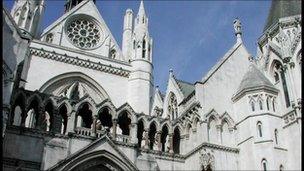Iraqi eyewitness: Mistreatment by UK troops
- Published

The High Court in London will begin hearings into the alleged torture on Friday
The High Court in London will hear allegations that 142 Iraqis were mistreated by British forces in Iraq between 2003 and 2008.
This case will determine whether a public inquiry should be held.
In a statement to the BBC, Britain's Ministry of Defence said it was, "vigorously contesting the application... These remain allegations of mistreatment - they are no more than that and remain unproven".
The MOD said a public enquiry would be "costly" and would be neither "necessary or appropriate". The MOD has set up a dedicated Iraq Historic Allegations Team to look into claims of abuse by British soldiers.
Ali Zaki Mousa is one of those who alleges he was mistreated by British forces in Iraq in 2006. He spoke to BBC World Service.
Ali Zaki Mousa, a former taxi driver who lives in Basra, Iraq
At about 0200 in the morning, while I was asleep with my wife and my little baby daughter, I was woken by the sound of an explosion. British soldiers immediately started firing shots, and smoke and stun grenades, and capsules which looked like ammunition.
My father, he's 62, he'd been sleeping in the front room; he started screaming. I put my little daughter down and I looked around, and then the soldiers started hitting me in the chest and genitals.
The soldiers forced me to kneel facing the wall and tied my hands with plastic handcuffs. Then they started kicking me and swearing at me. They kept using the "f" word and telling me to shut up.
I was beaten heavily around the eyes and my face became all swollen. One soldier pointed his rifle at my mouth; then they beat me heavily in the back around my kidneys using their rifle butts. The following morning I noticed there was blood in my urine.
Later on I found out that while I was in detention, British soldiers carried out intrusive searches of our women, including my relatives. They also beat my elderly father and my brother.
Then they blindfolded me and pulled me outside in my sleeping clothes and barefoot, and forced me to get into a tank. Then we were taken to Basra airport.
During the investigation with me in Basra International Airport, they accused me and some of my neighbours of being affiliated with militias and they said our area was under the control of militias.
They pulled me out of the tank and forced me to kneel with my head down and my hands tied behind my back. It was incredibly painful.
The more I screamed the more they kicked me. They tightened the plastic handcuffs further, and honestly they were very painful.
The time must have been about 0330 to 0400 in the morning when the soldiers started to beat the detainees in Basra airport one after the other, and I was one of them; they then interviewed us individually in a tent.
[They] accused me of being a member of the militias and that is not true. They threatened to remove my nails using pincers, and they threatened to remove my underwear and to force me to sexually assault myself using a bottle.
I was eventually released after I'd been in detention for 12 months.
[I was never charged,] except the accusation that me and my brothers were linked to the militias.
My father died recently and his body carried the marks of wounds as a result of beatings and punches from British soldiers.
I have my daughter, she was born before the detention. Now, 5 years on, I can't have any more children, and I still have the marks of the beatings on my back, around my kidneys and on my genitals.
Psychologically, I can't cope with any pressure from my wife or my child; if my wife talks to me about things I can't manage, I lose my temper and I beat her. All this is caused by the beating and the abuse I was subjected to by the British forces.
When the British forces first came into Iraq, the Iraqi people were so delighted at the defeat of Saddam the dictator, but then when British forces started behaving so badly, not only me, but all the Iraqi people, changed their view of the British troops.
We used to look at them as people who had come to help us, but they completely turned against us - with their tanks shooting in the streets, and the continued arrests without any legitimate or legal cause or proof. To us now they are no more than a pack of savage wolves.
- Published2 November 2010